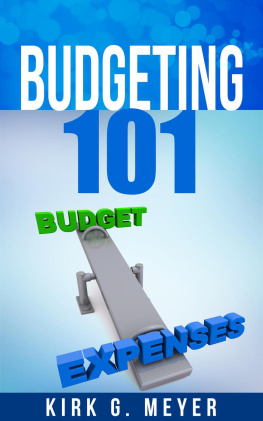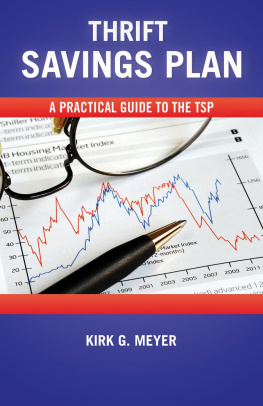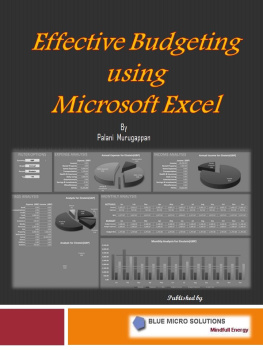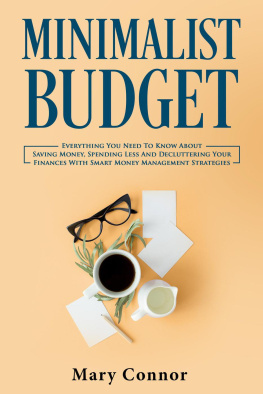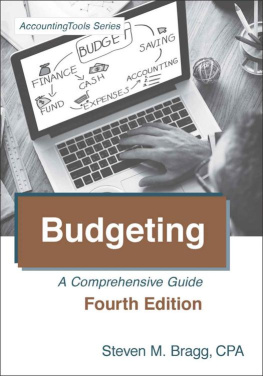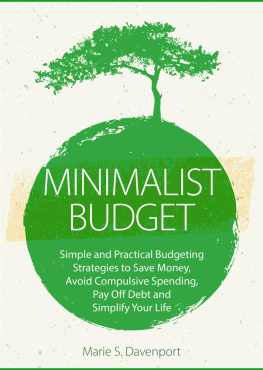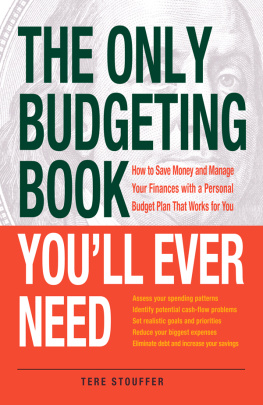Budgeting 101
By Kirk G. Meyer
Budgeting 101
Copyright 2014 by Kirk G. Meyer
All rights reserved. This includes the right to reproduce any portion of this book in any form.
Disclaimer: Every effort was made to describe the information in this book in an accurate manner as of the publication date. The author makes no guarantees regarding the information in this book.
I wrote this booklet to share my knowledge and experience with budgets and how they are the building block to healthy finances. If you are not aware of where your hard-earned money is going, then you will never be able to save or know where your money is going. By budgeting, you will be able to answer most of the questions you will have concerning your finances. These are things that everyone needs to know, and that is why I wrote Budgeting 101.
Why You Should Buy this booklet
A nyone who is old enough to earn some money needs to know and understand the importance of budgets. Without budgets, there is little to no chance that you will be able to stay on top of your finances. Budgets allow us to know how much money is coming in through jobs or any other source. Budgets allow you to figure out then the outflows of money and, more importantly, where those funds go. Only by knowing these things will you know where you stand with your finances. This booklet explains the budgeting process and provides you some places where you can get sample budget formats if you do not want to create your own. Get on top of your finances today and read this booklet.
A s a big thank you for getting Budgeting 101, I want to offer you some valuable gifts and a chance to get some on-going financial advice. Just for getting this book, it entitles you to my Budget Spreadsheet and Debt Reduction Spreadsheet that I normally sell for a total of $10. It is yours free for getting Budgeting 101 and signing up for my free email newsletters that have previews to my books. These special articles are geared towards personal finance and now access to these two useful spreadsheets. To get your spreadsheets now, go to my blogs website and sign up today. Visit www.kgmeyerpc.com today to get your free valuable spreadsheets.
Table of Contents
A budget is simply the process of projecting future income and expenses over a specified period. They are viewed as a roadmap of ones patterns of spending as well as saving. If a person does not know and understand where the money is spent, it is almost impossible to save properly. And to be honest, most Americans are not savers by any sense of the term because they tend to spend more than they earn. The key to avoiding the American spend- more-than-you-earn pitfall is to take the time and make a budget, so it is possible to know where ones hard-earned money goes during each period in the budget. A well-developed budget can aid a person or family in planning expenditures, help pay bills promptly, help to save for an emergency fund or achieve larger goals such as a down payment on a house, a childs education, and especially retirement.
Most already know the basics of making budgets, but where some people seem to fall short is in the implementation or execution of the budgeting process. The best way to develop and follow a budget is to approach it as a living, breathing document. Let us face it, and no one can prepare a budget at the beginning of the year with 100% accuracy, because first, no one can predict the future, and second, things in life happen. That is why it is important to understand that a budget acts as a roadmap to ones finances and is not set in stone. Luckily in todays world, there are several options available to aid and assist in budgeting. Some prefer a spreadsheet to track their finances. Others may prefer a Web-based budgeting software system. Still, others might prefer a site that has been created to follow all things financial, basically combining a balance sheet and income statement in one location. Others prefer older methods such as tracking things in a notebook or using the cash envelop system. We will take a look at all of these options later in the booklet. There is not a single right answer to how a budget needs to be created or tracked. The important thing is that a budget is established and used in some manner.
As the title of this section implies, some areas are considered budget basics. In the simplest terms, you can break a budget down into three components. But before developing a budget or budget plan, it is first important to track all expenses for a minimum of two, or preferably three, months to have a clear idea where the money is going, while also examining sources of income. The easier of these two aspects of budgeting is the tracking of income, as most have only one or two sources of income that will be the basis of the budget. Some people in retirement may have several sources of income considering social security, pensions, or other retirement accounts. Unless your budget takes taxes, insurance, and other payroll deductions into consideration, it is best to use the net income for budgeting purposes. If there is an insurance expense not accounted for in your payroll deductions, make sure to include it as an expense. It is also important to make sure all sources of income are listed, as a clear picture of the funding that will be made available for expenses is crucial. Now that you have tracked as all of your expenses over a two or three-month period, it will be fairly easy to estimate what one can expect to spend on various expense categories. Some expenses are considered fixed, such as a mortgage. Others may have a fixed frequency but variable amounts, such as a utility bill that is due each month, the same as a mortgage, but for varying amounts, based on the amount of water or electricity used for the month. Finally, there are truly flexible expenses such as entertainment that will vary in both frequency and amount. Avoid credit card debt to the best of your ability, and they are also considered a variable expense. Whatever the difference is between the total income and total expenses, hopefully, is excess income used for savings. But as it was pointed out earlier in this section, most American budgets run a deficit, meaning expenses exceed income.
Next page
